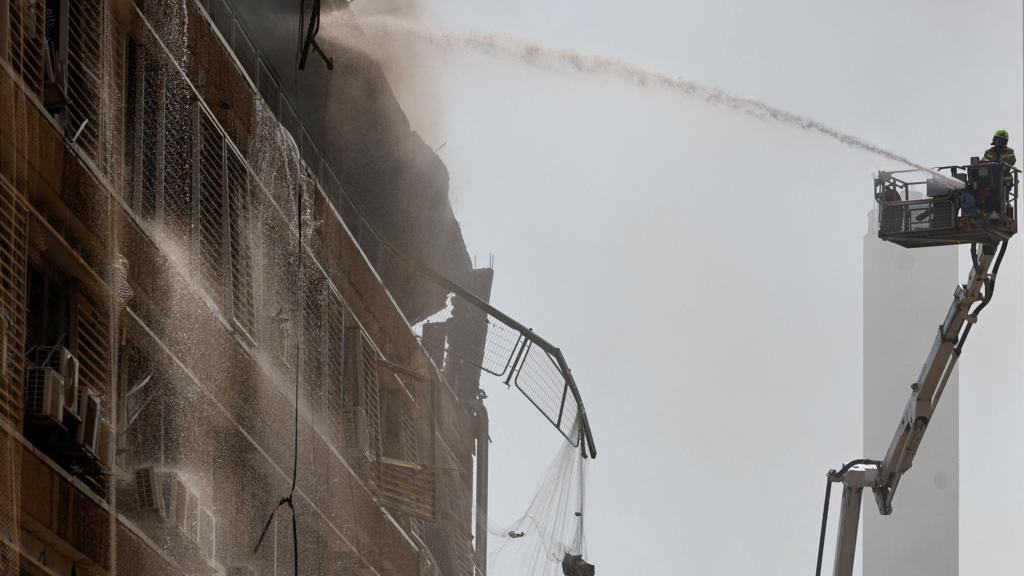An Israeli hospital in Beersheba sustained damage following a barrage of Iranian missile strikes on Israel, marking the seventh day of escalating conflict between the two nations.
Iran claims its targets were military sites near, not directly at, the hospital. Multiple locations across Israel were struck, resulting in 271 reported injuries, according to Israel’s health ministry.
Following a visit to the affected Soroka Medical Centre, Israeli Defence Minister Israel Katz declared that Iran’s supreme leader “can no longer be allowed to exist”.
Simultaneously, the Israeli military announced strikes on Iranian nuclear sites, including the “inactive” Arak heavy water reactor and the Natanz facility.
The conflict began on June 13th, with Israeli preemptive attacks on Iranian nuclear sites, resulting in the deaths of several high-ranking officials and nuclear scientists.
Israel’s deputy foreign affairs minister labeled the Soroka hospital strike “deliberate” and “criminal”.
In an X post, Sharren Haskel highlighted Soroka’s status as the primary medical center for Israel’s Negev region.
Israeli Prime Minister Benjamin Netanyahu vowed that Israel would “exact the full price from the tyrants in Tehran”.
Defence Minister Katz stated: “[Iran’s Supreme Leader Ayatollah Ali] Khamenei openly declares that he wants Israel destroyed – he personally gives the order to fire on hospitals.”
BBC correspondents on the ground described extensive damage, with debris and smoke lingering long after the blasts.
Hospital authorities reported that several wards were destroyed by fire, causing widespread damage including shattered windows and collapsed ceilings.
Approximately 200 patients are slated for transfer to other medical facilities, according to Soroka’s chief executive, Prof Shlomi Codish, who also expressed concerns about potential further building collapses.
Earlier Thursday, a ballistic missile strike on Ramat Gan’s business district, east of Tel Aviv, resulted in significant damage to a skyscraper and an electrical pylon, with roughly 20 reported injuries.
Prior to the attack, the Israeli military issued an X post urging residents near the Arak reactor in Iranian cities Arak and Khondab to evacuate immediately.
The targeted nuclear facilities included a partially completed heavy-water research reactor, capable of producing plutonium, a material usable in nuclear weapons.
Iranian media reported two projectiles impacting the area, with no subsequent radiation threats reported.
In a separate statement, the Israeli military confirmed a strike near Natanz, targeting “unique components and equipment used to develop nuclear weapons”.
Israel alleges Iran recently advanced its uranium enrichment program towards weapons development; Iran, however, maintains its nuclear program is strictly peaceful.
Iran’s armed forces declared their response would be “without limits”.
A complaint was filed with the UN nuclear watchdog, accusing Israel of violating international law by attacking nuclear facilities, according to Iranian state media.
These latest attacks unfold amid potential US involvement, as President Trump weighs direct intervention in Israel’s campaign.
Iran’s deputy foreign minister, Kazem Gharibabadi, warned the US of potential repercussions if it intervenes on behalf of Israel, stating Tehran will “have no other option but to use its tools to teach aggressors a lesson”.
Supreme Leader Ali Khamenei rejected Trump’s calls for surrender, and Iran has threatened to strike US military interests in the Middle East.
Trump’s next move remains unclear. CBS, a BBC partner, reports that he has approved attack plans but has yet to finalize a decision on striking Iran.
On Wednesday, when asked about US involvement, Trump stated, “I may do it, I may not do it”.
Additional reporting by Tom Bennett in Jerusalem
The BBC’s Lucy Williamson reports from outside Soroka Hospital in Beersheba, as emergency services assess the situation.
Israel’s PM claims to have targeted the heart of Iran’s “weaponization program,” while Iran insists its nuclear facilities are for peaceful purposes.
President Trump is considering whether the US should join Israel’s strikes on Iran as the conflict continues.
Israel’s Prime Minister has repeatedly warned of Iran’s proximity to developing nuclear weapons. BBC Verify’s Ros Atkins offers further insight into the Iranian nuclear program.
The conflict has created divisions within the US administration between isolationist and hawkish factions.

